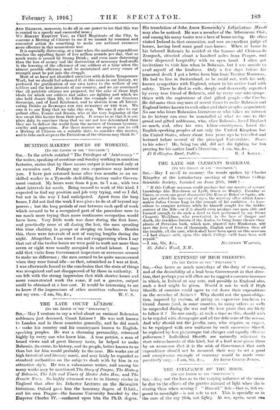MUNITION-MAKERS' HOURS OF WORKING.
[To THE EDITOR OF THE " SPECTATOR.") the article entitled " The Privileges of 'Aristocracy ' " the writer, speaking of overtime and Sunday working in munition factories, states that by these means output is increased only-at an excessive cost. Perhaps my own experience may interest you. . I have just returned home after two months as an un- skilled worker in a Tyneside shell-filling factory under Govern- ment control. My hours were .from 6 p.m. to 7 a.m., with two short intervals for meals. Being unused to work of this kind, I expected to find my position and job very trying, and so I did, but not in the ivay I had anticipated. Apart from the long hours, I did not find the work I was giver to do at all beyond my powers ; but the long periods of rest between each spell of work which seemed to be a recognized part of the procedure were to sue much more trying than more continuous occupation would have been. Very little work was done during the first hour, and practically none at all during the last, the men spending this time chatting in groups or sleeping on benches. Besides this, there were intervals of rest of varying lengths during the night. Altogether, I am sure I am not exaggerating when I say that out of the twelve hours we were paid to work not more than seven or eight were usually. occupied in actual labour. I may add that visits from Government inspectors or overseers seemed to make no difference ; . the men seemed to-be quite unconcerned when they were found idle—so that, astonished as I was at first, I.was afterwards forced to_the conclusion that the state of things was recognized and not disapproved of by those in authority. I am left with the, strong impression that with shorter hours and more concentrated work the gime, if not a greater,- output could be obtained at a less cost. It would be interesting to me to know if the impressions of other munition .volunteers bear


































 Previous page
Previous page